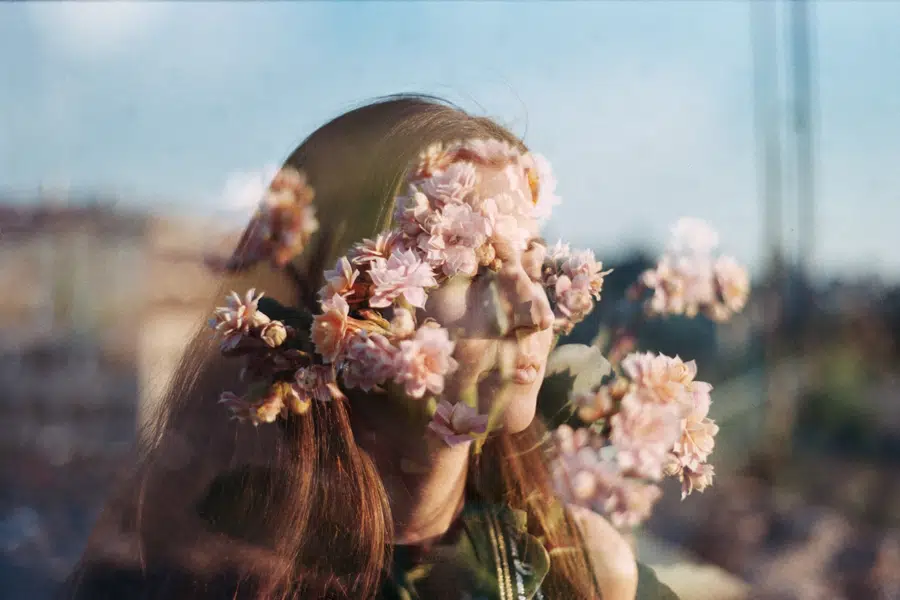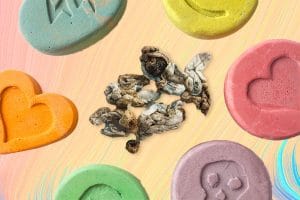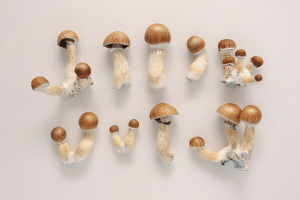Perpetually existing on the margins, never quite accepted and understood by proximate social, familial, and professional communities—it’s a historical narrative that the modern psychedelic movement has claimed throughout its advocacy. At first glance, this history of being ostracized feels like something I—a queer cynic—could get behind. For many, queerness and cynicism go hand-in-hand, and possessing that critical bent, which organically extends into a grasp of intersectionality, is notoriously met with labels like “judgmental” and “negative.” In psychedelic spaces in particular, many are quick to point out that this way of moving through the world is the exact opposite of the movement’s alleged overarching purpose: universal healing.
I grew into the fluid parts of myself in Ontario, where both of my parents were born after their own parents immigrated—to evade Russian labor camps on my Ukrainian side, and post-war poverty in my mother’s northern British lineage. So much ancestral material, from stories to photographs, was intentionally forgotten, blocked out, and left behind through my family’s continental shifts, which led to a lifetime of feeling detached, not quite here nor there, all while trying to make sense of my own identity. This raw and uprooted way of moving through the world brought forth a muddled sense of anger, particularly when I found myself standing on the outskirts—often literally—of normative contexts.
I naively dipped my toes in the psychedelic movement without confronting the ways my own white socialization afforded seamless access to it. At first it felt exciting, but very quickly, the cynicism I developed in straight spaces—a direct result of my own trauma and queerness—came rushing back in modern psychedelic pockets. Despite my efforts to lean into bottomless optimism, my attunement to gestures, words, and institutionalization runs too deep to feel comfortable in “love and light,” amongst scientists and their PowerPoints, or practitioners who post their yoga trips on Instagram, starting sentences by “inviting me” to reposition my interpretations of the world. I anticipated that psychedelics would inherently queer the heteronormativity of psychological communities, but when I dove in, I realized that equating psychedelics with queerness avoided addressing the patriarchal whiteness embedded in everything we do.
Read: Where Are All the Queer People in Psychedelics?
So where do the queer cynics go when we can’t unsee appropriation, and when our brand of psychotherapy is necessarily grounded in social justice? The answer, for me, was to fill in the gaps of the ancestral lineage I had flippantly deemed lost forever.
One day, while scrolling through a series of neon-colored tiles presenting Michael Pollan pull-quotes out of How to Change Your Mind and headshots of broscience mushroom entrepreneurs, I came across a psychedelic anti-racism workshop, hosted by The Ancestor Project, an education and ceremony support group based out of Baltimore. The founders of the initiative, Charlotte James and Undrea Wright, along with guest speaker and spiritual mentor Bridget Nistico, would facilitate seminars for white people to investigate their own Indigenous traditions, as a way of actively countering appropriative tendencies. I immediately signed up.
My direct experience of my Ukrainian heritage has always been intertwined with Christianity. The colors, language, and smells that at first felt warm and familiar always had a way of taking me on a detour to Jesus where, as a little kid who felt enough aching discomfort without the pressures of piety, I recoiled. In Ukraine, in the late tenth century, Prince Vladimir the Great changed the state religion to Orthodox Christianity, and proceeded to destroy every pagan and non-Christian temple or icon in sight. Up until attending The Ancestor Project’s workshop, I never thought about tracing my ancestral lineage back to a time before Christianity, probably because my immediate familial trauma suspended me in the present. “Sometimes we just need a little push,” said James, smiling, during one of the Project’s seminars.
How to Grow Shrooms Bundle
Take Both of Our Courses and Save $90!
I was hopeful when I left the session, immediately turning to Google to locate anything I could find on Ukrainian paganism, but at first my efforts yielded few results. I began to realize that generations of colonization in its various forms, from Vladimir’s reign to the Soviet period, had wiped out a lot of the information I was looking for. To get more information, I reached out to Christine Worobec, research professor emerita at Northern Illinois University, who specializes in the history of witchcraft and peasant communities in Russia and Ukraine. She broke it to me softly: “When we’re talking about ancient stuff, we simply don’t have the sources. What we do have emerges much later, and it’s often been Christianized. The closest you can get to documentation of older traditions is through folklore, which has also evolved into Christianity over time.”
While straightforward at face value, researching our ancestors to combat cultural appropriation quickly becomes confusing. I was coming up short, and I also didn’t want to seem like I was wielding my own roots as a way of countering critical conversations on Indigeneity, similar to how I’d seen psychonauts inject light reminders that MDMA was invented by a German whenever cultural credit was being discussed. But the more I leaned into this discovery, the more these issues resolved themselves.
On the topic of the complexities of appropriation and space, Wright reminded me that when talking to elders, what they often want to know is, “Do you approach practices with a sense of gentleness, respect, and honor? Do you have a connection to the practices? Have you built an altar?” They want to know whether you want to truly establish a connection to your traditions, “because the deeper you are rooted in them, the less you’ll take advantage of them.”
Building on this notion, James reminded me that there are many discussions revolving around “who has permission to serve certain medicines,” which is “a necessarily nuanced conversation.” But it’s important to remember, she added, “that the medicine is the one who calls us in and tells us who is called to serve. It’s how you go through the process of learning that either respects the communities of these medicine keepers—or doesn’t.” And it’s true: the more I research my own ancestry—its herbs, its smells, its medicines—the more specific my own practices become, guided by this ancestral connection.
As a descendent of white settlers in Canada, my discomfort with the psychedelic boom was not only part agitation over appropriation, but part detachment from my own Indigenous lineages. As time marches on, and as I become more grounded in my own mycological and herbal practices, my experience might evolve into an invitation to other traditions, but until then, my self-discovery is necessarily nestled in the knowledge of my ancestors.
Read: Can Ayahuasca Help Us Communicate With the Souls of the Dead?
After deep dives on Reddit and clicking through expired forums with dead ends, reading about contemporary practitioners who had disappeared or been ostracized from their communities for selling snake oil or practicing witchcraft, I finally found a link to an archival documentary called Molfar, produced by Green Dossier in 2004 in the Carpathian mountains, documenting the life of a local Ukrainian folk healer. The Molfars are an ethnic group primarily associated with the mountains in western Ukraine and adjacent Romania, etymologically tied to the Slavic kochul, which translates to “nomad,” referencing the shepherd communities who fled into the mountains from Mongol invasions in the thirteenth century. While many Hutsuls today identify as Catholic, their folk traditions, celebrated at the transition of seasons with reverence to the natural world, suggest pre-Christian influence. But, as Worobec explained to me in our call, there is no way to verify this suggestion, past speculation or intuition, alone.
As the mountain pastures appeared on my screen, the film’s accompanying mountain music—Medieval hurdy-gurdy vibrations—filled my headphones. Holy shit, I thought. This feels familiar. “When I come up to a plant, I pick one and leave two,” said Nechai, the documentary’s subject. “And I always say what I pick it for.” Watching this herbalist course through his mountain home, explaining the importance and potential of each plant, revealed the importance of ecology in my own lineage. Suddenly, psychedelics felt accessible through ancestral discovery, rather than a phenomenon reserved for the discomfort of white-walled clinical settings, or quiet observation through others’ practices.
For those of us whose cynicism gets the best of us in psychedelic spaces, I encourage you to listen to your critical intuition, rather than averting your focus in shame. I spent a long time interpreting my queerness as something that required my existence to be stationed on the fringes of the tastes and smells that feel like home. But the more I discover about my ancestral roots, the more my cynicism is replaced with softness—not always, but often enough. By slowly untangling the realities of ancestral trauma across centuries, I understand the behaviors in myself and my family members that I would not have discovered without the very cynicism that led me here.
Interested in having a psychedelic experience, but don't know where to start? Get our definitive guide on trusted legal retreat centers, clinical trials, therapists, and more.
We started DoubleBlind two years ago at a time when even the largest magazines and media companies were cutting staff and going out of business. At the time we made a commitment: we will never have a paywall, we will never rely on advertisers we don’t believe in to fund our reporting, and we will always be accessible via email and social media to support people for free on their journeys with plant medicines.
To help us do this, if you feel called and can afford it, we ask you to consider becoming a monthly member and supporting our work. In exchange, you'll receive a subscription to our print magazine, monthly calls with leading psychedelic experts, access to our psychedelic community, and much more.



